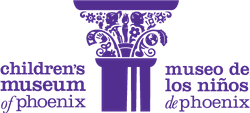Character Champs
The Children’s Museum of Phoenix is growing alongside your little one! We have embarked on an initiative to support research, community engagement, prototyping, and evaluation around new character development programs at the Museum. This innovative program is made possible by Lilly Endowment Inc.
On this page you can learn about Character Development in young children and how the Museum’s interactive exhibits and programs help to foster and encourage future “Character Champs” in our community, all while using their minds, muscles and imaginations to play and learn.
Currently, we are featuring the following Character Traits:
Curiosity: The excitement you feel to know more about something.
Creativity: Using your imagination to create new ideas.
Ways Your Child’s Character is Developing as They Grow:
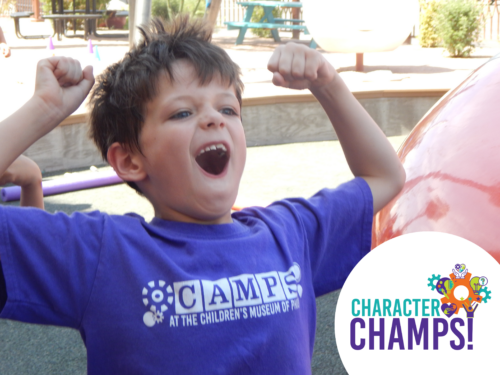
Help your “Character Champ” learn and grow at home!
Select a heading below to learn more.
Follow your child’s lead! Ask open-ended questions, “What else?”, “What do you think will happen if…”. Give your child access to books, materials, and tools for open-ended play. Engage their curiosity by inventing a story together, planting seeds outside and watching them grow, building a fort in the living room, or experimenting with different ingredients by cooking something together in the kitchen.
Designate a creative space at home for music, drawing, building, and crafting. Play dress up in clothes from everyone’s closet, and use scarves, towels, and blankets for a fashion show. Invent a dance or song for every room in your home, make homemade play dough in the kitchen, and build the silliest creatures. Engage their creativity by painting with various materials like feathers, string, toothbrushes, forks, cotton swabs, and more!
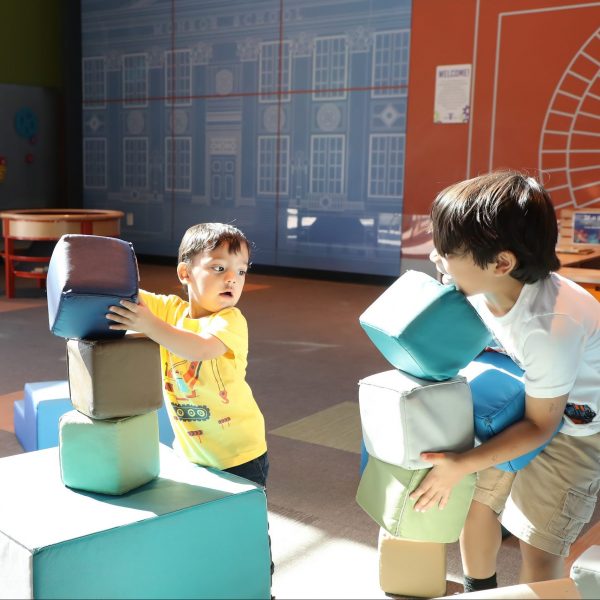
Sensory
During this beginning phase of early childhood, children will develop their senses, sparking their curiosity of the world around them. Their eyesight will develop, observing objects, animals and people around them. They will begin using their fine and gross motor skills to grasp objects, clap their hands, turn their head towards sounds they hear, sit up, crawl, bounce and stand. They will start communicating through cries, coos, babbles and vowel sounds, eventually laughing. Their creativity grows as they imitate sounds, facial expressions, and emotions and speak simple words.
Your child might stop and look in awe at the Museum’s CD Wall, curious as to what the shiny objects are and why they “sparkle” in the light. They might be inspired to create the tallest tower in Blockmania, as they parallel play next to other visiting littles.
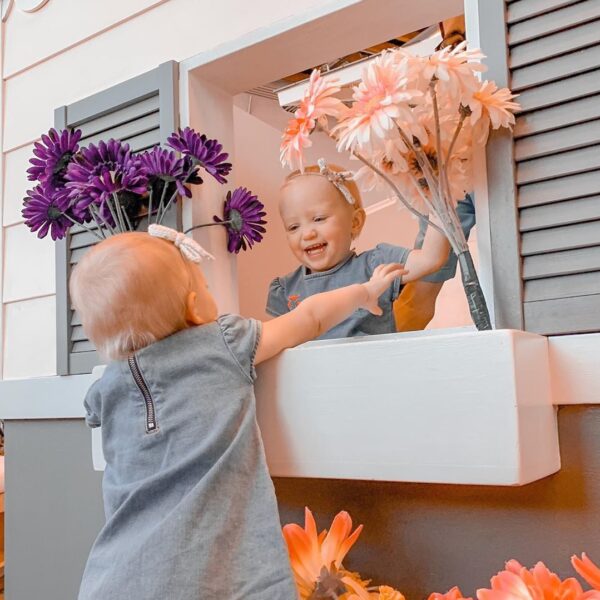
Exploring
In addition to their sensory growth, this next phase of early childhood development brings expanding exploration. Continuing to use more and more of their large muscles, children will begin to physically discover the world around them. They may reach movement milestones, and begin walking, reaching, holding things, pointing at, and learning the names of objects they are curious about. They will be using more words, developing vocabulary as they explore, increasing their confidence, and leading them to creative pretend play.
Your child might be curious about the slide in the Museum’s Threes & Younger exhibit, climbing each step all the way to the top with confidence before feeling their way back down the slippery slide. They might engage in creative and simple role play as they gather all the flowers in the exhibit for their playhouse.
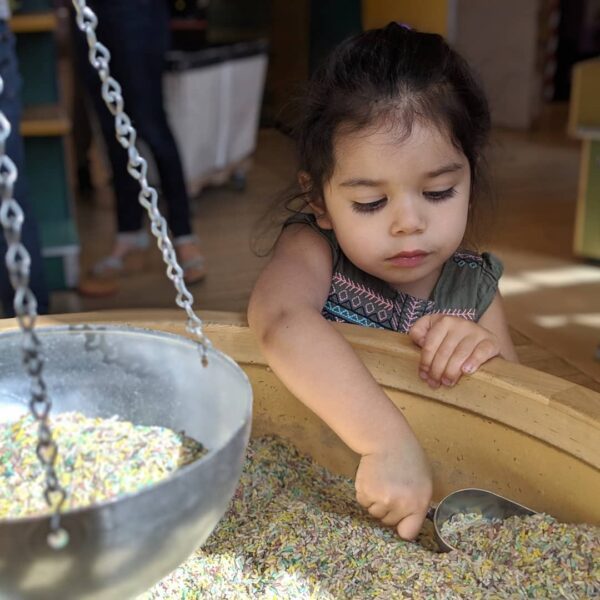
Independence
This next advancing phase of early childhood brings more independence. Children will start to develop those adaptive life skills, such as dressing themselves, using the toilet alone, feeding themselves, asking more pointed questions, refining fine motor skills with drawing, writing, cutting with scissors, and learning self-control. This increased confidence in their minds and bodies brings more understanding of emotions and begins the stage of associative play with others, sharing materials, and talking to each other.
Your child might be curious about the colorful rice table in The Market exhibit, eager to scoop and touch the rice as they pretend play in this child-sized grocery store. They might get creative and act out roles as cashier or stock worker, replacing the pretend food items back on the shelves. They might pick out ingredients to “buy” and make food for their family.
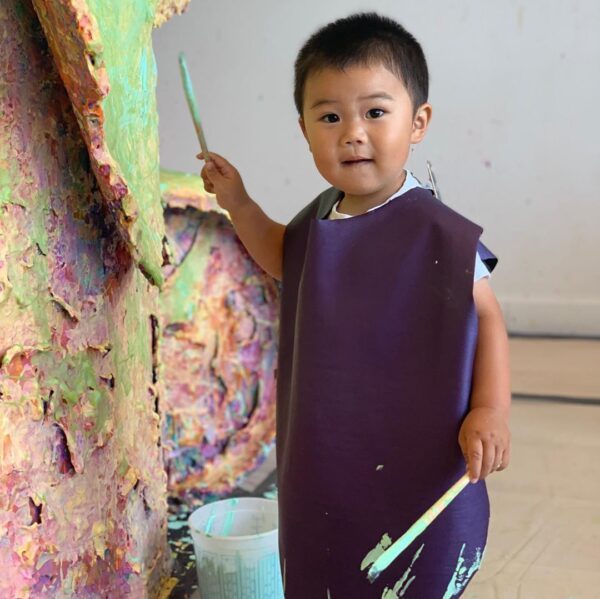
Personality
As children continue to develop their independence, this next phase of childhood marks the time when their personality starts to shine. They begin to feel comfortable being around others in their life, expressing their likes and dislikes. They form their favorites, foods, colors, songs, entertainment and games. They understand their feelings in their bodies and know when they've done something wrong. They are gaining in school readiness skills such as holding pencils properly, recognizing letters, developing literacy, processing stimuli, maintaining and changing emotions, learning to share, expressing their wants and needs while engaging in social relationships with other children similar in age.
Your child might be curious about the buckets of bright-colored paint in the Art Studio and enjoy helping a Playologist mix in new paint colors into the buckets creating a new shade. They can draw or recognize shapes as figures or letters as they build a Thing-a-ma-jig from recyclables.
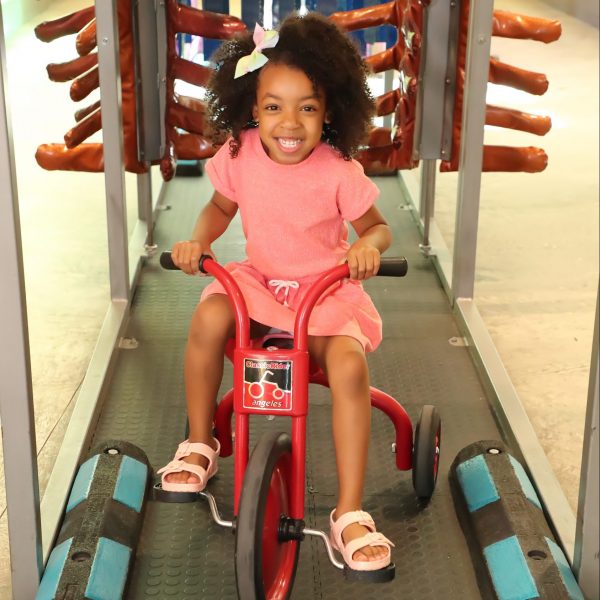
Learning
In this phase of school-age dynamics, your child thrives in a world of learning. Their language and vocabulary advances, they form opinions, they can make comparisons, connections, and progress in their understanding of various and complex subjects such as writing, math, and reading. They may show intense interest in focused areas such as dinosaurs, dolls, sports, dancing, or painting. They understand the importance of friendships, take an interest in how they present themselves to others, and begin to resolve peer conflicts without adult help.
Your child might be visiting the Museum on a field trip with their classmates. Their curiosity is piqued as they explore Pedal Power, seeing the trikes ride past and hearing the air rush in this pretend carwash. They recognize street signs decorating the walls. They get creative with their friends, moving the brushes as all sorts of different kids go through, maybe they pretend to direct traffic or add car sounds to the environment.
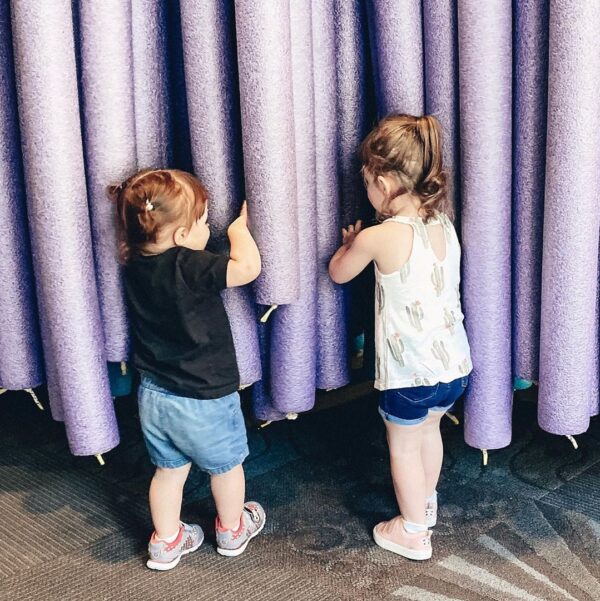
Teamwork
As your child continues to grow through their first years of primary learning, leading up to preteen age, they begin to connect deeper with peers, entering a phase of teamwork, and understanding the part they play in group dynamics. They may become more competitive in their play as they start to think critically, applying logic and reason to their social structures. Their friendships are more important than ever, as they learn to express subtle emotions along with big feelings as they may change emotions quickly. Working in a group will help to further form their communication, empathy, patience, and respect for others. They may begin future thinking, considering hypotheticals and the perspective of others.
For example, your child could be attending Camp at the Museum, enjoying their time playing in various exhibits with the other campers. Perhaps they see the pool noodles hanging down from the ceiling in Noodle Forest and they are curious as to how far back the noodles go! They work together with their peers to navigate pathways into the forest, following one after the other, only to instinctively break off the path and create a cooperative game akin to ‘hide-n-seek’ with added elements of a pretend storyline wherein specific-colored noodles cannot be touched or you’re out.
